University of Texas at Austin Team Wins Robot Soccer World Championships in Two Divisions

06/27/2012 - AUSTIN, Texas — UT Austin Villa, a team of computer science students led by professor Peter Stone, won two 2012 Robot Soccer World Cup division championships during RoboCup 2012 last week in Mexico City.The annual tournament, founded in 1997 to foster innovation in artificial intelligence (AI) and robotics research, is often touted as the world’s biggest robotics and artificial intelligence event.



